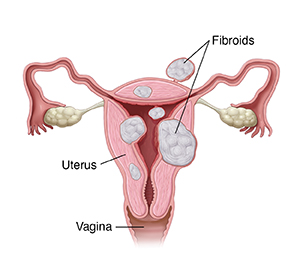A
B
C
D
E
F
G
H
I
J
K
L
M
N
O
P
Q
R
S
T
U
V
W
X
Y
Z
Topic IndexLibrary Index
Click a letter to see a list of conditions beginning with that letter.
Click 'Topic Index' to return to the index for the current topic.
Click 'Library Index' to return to the listing of all topics.
Myomectomy
Myomectomy is a surgery to remove uterine fibroids. This surgery may help you keep your uterus. And it may help you keep the choice to get pregnant.
Before your surgery
You may be asked to:
-
Have tests that your healthcare provider has ordered.
-
Don't eat or drink for a certain amount of time before surgery. Your healthcare team will tell you how long.
-
Take medicines as prescribed to shrink fibroids.
-
Stop taking aspirin or ibuprofen 1 week before surgery. Tell your healthcare provider what other medicines you take. Ask if you should stop taking any of them.
-
Arrange for a friend or family member to drive you home after surgery.

Types of myomectomy procedures
Abdominal
Your surgeon makes incisions (cuts) in your belly and uterus. They then remove the fibroids. Then the uterus is repaired. The incisions are closed.
Laparoscopic
Your surgeon puts a laparoscope and other surgery tools through small incisions in your belly. They make 1 or more incisions in your uterus to remove the fibroids. Then the uterus is repaired. The incisions are closed.
Hysteroscopic
A hysteroscope is put into your vagina. A tool is then used to remove the fibroids from your uterus.
When to call your healthcare provider
Call your healthcare provider right away if any of the following occur:
-
Pain that is severe or gets worse
-
Fever or chills
-
Nausea or vomiting
-
Redness or swelling around your incision
-
Vaginal bleeding that is heavy or doesn’t stop
Online Medical Reviewer:
Donna Freeborn PhD CNM FNP
Online Medical Reviewer:
Heather M Trevino BSN RNC
Online Medical Reviewer:
Irina Burd MD PhD
Date Last Reviewed:
8/1/2022
© 2000-2025 The StayWell Company, LLC. All rights reserved. This information is not intended as a substitute for professional medical care. Always follow your healthcare professional's instructions.